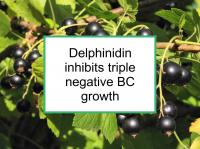Delphinidin is an anthocyanin pigment found in a variety of blue, red and purple fruits, especially berries such as blueberries, black currants, and cranberries. Delphinidin has previously been reported to suppress the growth of hormone receptor positive (ER+/PR+), HER2+ and triple negative (ER-/PR-/HER2-) breast cancer cells.
Now a new study has reported that delphinidin inhibits carcinogen-induced transformation of normal cells into breast cancer cells and also inhibits tumor growth in a mouse model of triple negative breast cancer.
Latest research finds delphinidin inhibits BC development
The study referenced at the beginning of this new story was designed to investigate the mechanism of action by which delphinidin-3-glucoside reduces breast carcinogenesis and growth, including the role of the Akt/HOTAIR signaling pathway. Activation of the Akt gene is frequently observed in human cancer cells. In particular, long non-coding RNA (lncRNA) HOX transcript antisense RNA (HOTAIR) plays an important part in cancer progression. This is regulated by the interferon regulatory factor-1 (IRF1) and up-streaming Akt activation. Therefore, down-regulation of Akt/HOTAIR signaling is one possible strategy for breast cancer prevention.
To conduct the study, the authors first treated non-cancerous MCF-10A human breast cells either with two carcinogens or with the carcinogens plus delphinidin for 30 days. The cells were then evaluated for cancer-associated properties using a variety of tests. Exposure to the carcinogens was found to induce malignant transformation in breast cells. This transformation was effectively suppressed in cells co-treated with delphinidin through inactivation of the Akt/HOTAIR signaling pathway.
In a second experiment, the authors implanted bioluminescent MDA-MB-231-Luc-GFP triple negative breast cancer cells in mice to generate tumors in them. Delphinidin was found to inhibit the growth of these xenografted breast tumors, again by decreasing HOTAIR. The authors conclude that the findings suggest that delphinidin is effective in inhibiting breast carcinogenesis, in part through down-regulation of HOTAIR.
